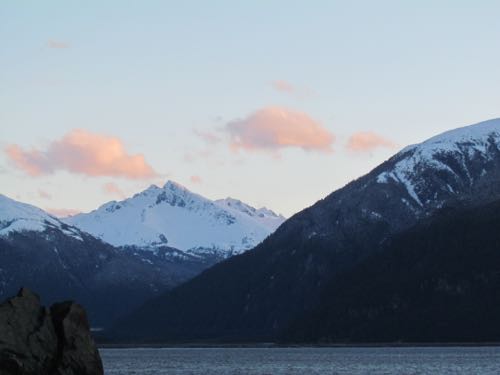Mornings have been ineffably sweet lately. As we gain 5 minutes of daylight each day, we wake to softly increasing sunlight coming through the window at the foot of the bed. Particularly during the sunny weather recently, this expanding daylight awakens us gently and comfortably. Each subsequent day, it comes a little bit earlier.
Closer to the Summer Solstice, it will shine strongly in on us long before we’re ready to rise. We’ll likely hang heavy curtains to block it out until we’re awake. For now, though, we wake naturally at the right time of morning to suit our lifestyle.
I’ve spoken in the past about how natural light dominates our life (see Ebb and Flow). We belong to a tiny minority of Americans whose lifestyle involves very little man made light. Our circadian rhythms are much more closely aligned to the natural cycle of light and dark than most people’s. Studies indicate that this is much healthier than relying heavily on artificial light.
We appreciate our reliance on natural light throughout the year, but even more so at this season, when daylight increases after the Winter Solstice.
Sadly, this natural progression will derail soon. In fact, it happens tomorrow morning.
Alaska, like most of the other United States, observes Daylight Saving Time. Tomorrow morning, our sun, which has begun its gentle predawn glow around 5:00 or so, will “magically”—which is to say incongruously, jarringly, and in my opinion unnecessarily—begin around 6:00 a.m.!
I have “raged against the saving of the light” in the past, then, as now, to little or no avail (see Stop Messing Around with Time!).
Ironically, we belong to a class of people for whom Daylight Saving Time supposedly applies more than any others. We are, in essence, farmers. We garden for much of our living. In addition, we fish, gather, harvest firewood, and more, relying on daylight to perform our work, which largely takes place outdoors. It seems that if we find it unnecessary to change the clocks, few others should care either. As it happens, though, it appears most farmers hate Daylight Saving Time!
I understand that our State Legislature has another bill before it to kill Daylight Saving Time in Alaska. It won’t pass, of course. Alaska, for all her pride in being The Last Frontier, cannot seem to lead in this country. We are, inevitably, a state that follows the leads and whims of the other states. Instead of joining Hawaii, most of Arizona, and the U.S. Territories in ignoring Daylight Saving Time (which they seem to do very well, despite being in very different latitudes from us and each other) we follow the rest of the country. Heaven forbid that we should cast our vote against arbitrarily changing time twice a year, adding one more vote toward doing away with this useless exercise, at least in states, like Alaska, where it makes no sense. For us, it’s the right place, but the wrong time.
As I noted in another rant, It’s Happening Again – Daylight Saving Time Returns to Screw Things Up, humans take about 3 weeks to adjust to such a time shift, almost exactly the same amount of time it takes for daylight on the homestead to return to the schedule it had been on before Daylight Saving Time.
I suppose we have an advantage, in that our life is not as regimented as most. Still, we’ll feel the effects, as we do every year, as we adjust to the new time for radio programming, tides, Michelle’s work in town, and myriad other instances in which we are forced to play along in this twice yearly charade.
There’s little I can do each year than what I have done: complain about the stupidity of the institution, and make a point of savoring these last few mornings of natural light.
By the way, it isn’t just me! (paid link.)

